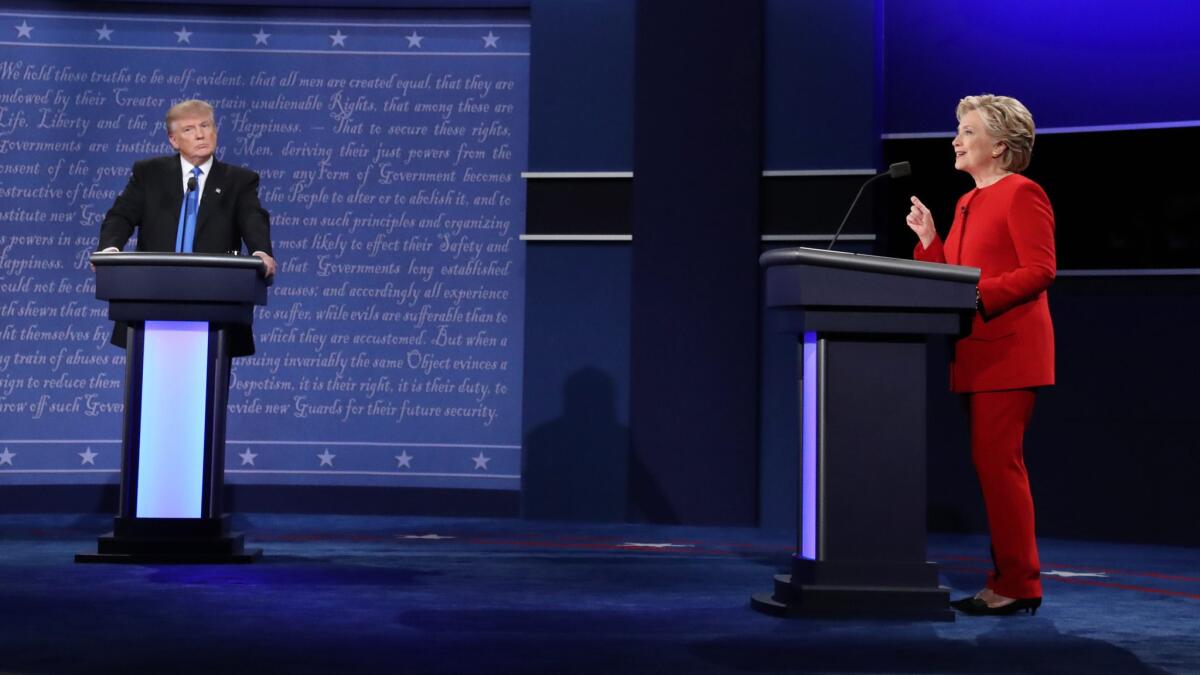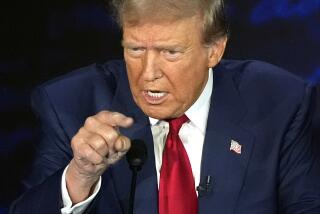Analysis:: Trump flinched under Clinton’s criticism, but this race is not over

- Share via
Reporting from Hempstead, N.Y. — Donald Trump left the protective bubble of his partisans on Monday and learned a well-established truth about campaigns: The rhetoric that draws rapturous applause at rallies doesn’t play as well in the outside world.
The Trump onstage Monday was the Trump seen every day in his campaign. He used the same language, told the same stories, decried the same disasters. But he did not do what a 90-minute debate gives candidates an opportunity to do: flesh out an explanation of how he or she would run the country, and invite voters who aren’t already committed to come along for the ride.
Instead, Trump flinched under Hillary Clinton’s tough criticism.
Worse, he made off-the-cuff remarks that lent credibility to her critiques of him. He defended saying the housing crash was a good business opportunity. He said that not paying federal income taxes “makes me smart.” He insisted that not paying contractors according to their contracts was another business decision.
He insisted over and over that he had not said things about women and the Iraq war that, because of millions of dollars of ads aired already in this campaign, American voters have already seen and heard him say.
He also did little to prosecute his case against Clinton. He did hit her repeatedly for being part of the political status quo. But her biggest liability — the fact that a majority of voters don’t trust her — went almost unmentioned. Another negative for Clinton, her use of a private email system while secretary of State, was barely touched. When Trump did bring it up, it was as an attempt to change the subject from his unreleased income tax returns.
Clinton, for her part, offered a more thorough explanation of what her presidency would entail, ticking off multi-part plans for improving the economy and race relations and fighting terrorism at home and abroad. But she also needled Trump on both policy and personal matters.
Early on, in a segment about the economy, she said Trump’s business empire had been salted with $14 million from his father — a reflection of the $1-million loan the Republican acknowledges and other loans that came to light recently. Trump seemed unnerved and afterward defended his business practices repeatedly, taking time that he could have spent crafting an argument for voters not already on his side.
Clinton’s performance — which Democratic analysts and some Republicans as well regarded as dominant — probably will not result in a massive shift to her side of the electoral ledger; Republicans have rallied around Trump lately, and polarization more than anything suggests a continuing close race.
But Clinton certainly quelled concern among her supporters about her recent slip in the polls. And — particularly when the debate turned to Trump’s past references to women, Latinos and African Americans — Clinton laid the groundwork for improvement among voter groups that she needs to gain the White House on Nov. 8.
The debate, the first of three presidential meetings within the next month, occurred as a host of national surveys showed Clinton and Trump locked in an extremely tight race for the presidency. Clinton has held on to an edge in the low single digits nationally, but Trump has mounted a surge in the battleground states that will decide the winner in November.
That had suffused his campaign with confidence. But none of the new polling has changed the rough dynamics of the race.
Clinton has a strong lead among women, nonwhite voters and the college-educated. Trump has a strong hold on rural and non-college-educated voters. The two have been tussling over suburbanites who usually lean Republican, and younger voters who have not warmed to the Democratic nominee as they did to the predecessor in that role, President Obama.
Those were the voters each campaign should have targeted on Monday night. But at times it appeared only Clinton had her eye on them.
The suburban voters have backed away from embracing Trump because of his history of coarse comments about women, the disabled and other groups, and because of concerns about his lack of experience navigating a treacherous world of nuclear-armed opponents.
He could have mitigated at least some of their worries by coming out with a calm recitation of the steps he would take, for example, to diminish the reach of Islamic State. But he offered little but an indictment of Clinton and Obama for allowing that militant group to grow.
That was an improvement, perhaps, from his usual statements that they “founded” Islamic State.
But if viewers were looking for an explicit path forward on that brand of terrorism, increasingly a domestic concern, it did not present itself.
Clinton, whose studying for the debate was mocked at one point by Trump, pointed out the complicated origins of Mideast troubles — including the role played by the last Republican president, George W. Bush — and ticked off elements of her plan.
With an eye to those suburban voters, Clinton also listed, at one time or another, almost every gibe Trump has made that ruffled them; Trump did not always disagree.
At one point, she reminded viewers of a lesser-known Trump line, in which he promised to blow out of the water Iranian sailors who taunted U.S. troops. That, Clinton said, would beget war.
“That wouldn’t start a war,” Trump replied, essentially confirming her recap of the comments.
The upside to Clinton among younger voters came with her explication of Trump’s five-year campaign to disqualify as president Barack Obama, for whom those voters were much of his base. But she also took pains during parts of her remarks to reach out on other fronts.
From the first answer, she repeatedly talked of investing in American jobs, increasing income equality and raising the pay of women — all subjects of concern to young voters.
“I want us to invest in you. I want us to invest in your future,” she said.
Typically, one party’s pitch for a third successive term is an uphill battle, given the usual desire for change, especially notable this year in a nation whose economic recovery has been mottled and uneven.
Trump made a stab late in the debate at framing Clinton’s succession of Obama in a negative way.
“Let me tell you, Hillary has experience, but it’s bad experience,” he said.
He added: “And this country can’t afford to have another four years of that kind of experience. “
The tenor of the night might have changed had Trump opened the debate with that argument and pressed it throughout. But he did not seem to have spent time crafting a plan of action for the debate, which is a basic step expected of candidates, whatever their experience level.
And so the debate, repeatedly, shifted on to terrain more helpful to Clinton.
Then, too, Trump has made so much of this campaign about him — and drawn so much support for doing it that way — that it was not surprising that he might have had trouble shifting his focus away from his favorite lines.
Throughout, too, Trump was testy toward both Clinton and debate moderator Lester Holt, the NBC anchor, repeatedly speaking over them.
The extent to which he has dug a hole for himself by not delivering a more promising performance was evident when he was trying to deny that he supported the Iraq war, as did Clinton.
“Why is your judgment — why is your judgment any different than Mrs. Clinton’s judgment?” moderator Lester Holt asked.
“Well, I have much better judgment than she does. There’s no question about that. I also have a much better temperament than she has, you know?”
At that, the audience in the Hofstra University debate hall laughed, as if his view was not theirs.
Trump has two more debates in which he can attempt to broaden beyond his loyal supporters toward a plurality of voters casting ballots in November.
But the first debate, both because it occurred as he was rising in the polls and because it is likely to be watched by the most Americans, served as his best shot at opening a significant lead over Clinton.
The race is not over, not for 42 more days. But Trump’s opportunities are certainly diminishing in number.
Twitter: @cathleendecker
ALSO:
First debate could be last chance to sway voters
Updates on California politics
Live coverage from the campaign trail
More to Read
Get the L.A. Times Politics newsletter
Deeply reported insights into legislation, politics and policy from Sacramento, Washington and beyond. In your inbox three times per week.
You may occasionally receive promotional content from the Los Angeles Times.











